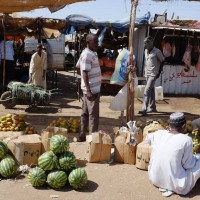 With a visa for Ethiopia in our pocket we leave Khartoum and head for the border. It is about 600km to the border town of Metema. South of Khartoum there are no places of interest that we want to visit, so we plan to ride two full days. If we then camp just before the border on the second day, we can arrive there early to complete all the formalities so we still have sufficient time to ride to the first campsite in Ethiopia.
With a visa for Ethiopia in our pocket we leave Khartoum and head for the border. It is about 600km to the border town of Metema. South of Khartoum there are no places of interest that we want to visit, so we plan to ride two full days. If we then camp just before the border on the second day, we can arrive there early to complete all the formalities so we still have sufficient time to ride to the first campsite in Ethiopia.
Once we have left the bustling Khartoum, the landscape quickly changes into dry, dusty plains. No more expensive cars or high buildings, but mud houses and donkey carts. Only the main road on which we drive is paved, all other roads are dirt roads with deep potholes. But even the paved road is in poor condition. We regularly need to slalom between the potholes to avoid a flat tire.
We drive through villages with long rows of small shops just next to the road. Oddly enough, you often find a number of the same shops next to each other. First a row carpenters who all offer the same wooden frames, then a row of blacksmiths with the exact same metal fencing and then a row of restaurants. What is also striking, is that you can get a Coca Cola everywhere. In the most deserted village and most secluded restaurant you can always get a bottle of sugarwater. A bottle of Coke 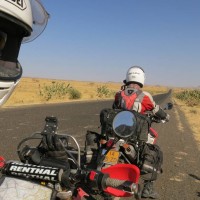 is often more readily available than a bottle of water. There is tap water, but we only use that to brush our teeth and to cook, not for drinking. A good alternative is tea. The water has been boiled, so it is safe to drink. And along the way there are ‘chai-mamas’ everywhere selling spicy tea.
is often more readily available than a bottle of water. There is tap water, but we only use that to brush our teeth and to cook, not for drinking. A good alternative is tea. The water has been boiled, so it is safe to drink. And along the way there are ‘chai-mamas’ everywhere selling spicy tea.
At one of the many villages we stop at the market to buy some fruit and vegetables. While I am negotiating about the price of bananas, a large group of Sudanese men gather around the bikes. Peter is subjected to a cross-examination. “What brand is the motorbike?“, “How many cc?”, “What is the maximum speed?” and the most asked question “What does the motorbike cost?“. As I put away the groceries I get out my camera to take some pictures of the crowd. After two pictures I walk across the street to take some picture from the market, the group of Sudanese men and the white helmet of Peter showing just above the crowd. When I get back to my bike and want to store away the camera, a man next to me commands in a loud voice out of nothing that I should delete my pictures.
“Sorry? Delete my pictures?“.
“YES , DELETE THE PICTURES! NOW!“
In Sudan you require a permit to travel through the country and to take pictures. With this permit you can take pictures, but still not all pictures. As in many other countries, you cannot take any photos at strategically important points such as bridges and police posts. In Sudan the rules are even more strict as they do not allow you to take any pictures of ‘public buildings’. The problem is that a lot of the buildings fall under that Sudanese definition and you may not always be aware of that. Sudan even adds to this by also prohibiting photos of slums and beggars.
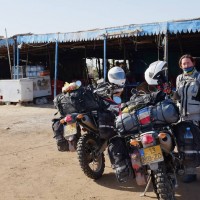 JYou need to carry several copies of the permit with you so you can always give one to the police when requested. We only heard of the compulsory permit in Khartoum and did not want to put in the effort to get one at that time. It went fine without a permit so far. We figured that the last two days in Sudan, from Khartoum to the border, would surely be OK as well. Or so we thought.
JYou need to carry several copies of the permit with you so you can always give one to the police when requested. We only heard of the compulsory permit in Khartoum and did not want to put in the effort to get one at that time. It went fine without a permit so far. We figured that the last two days in Sudan, from Khartoum to the border, would surely be OK as well. Or so we thought.
The man again demands that I remove the photos. Because he is not wearing a uniform it is not clear whether he is a police officer who commands me to delete the photos or whether he is a bystander who did not like that he was photographed. A bit overwhelmed by his command I ask once again what he means and explain that I want to take pictures because Sudan is such a beautiful country. But he does not want to talk. He points to a man in uniform who is standing a little further away and says: “We are police. No talking. Delete! NOW!“
It is clear what he wants. Apparently I have made pictures of a subject they do not like. There is no building around for miles that can be regarded as a “government building”, so probably the market is considered to be ‘slum’. Just before he wants to take the camera out of my hands I decide to delete the photos. Especially since we do not have a permit, I do not want to risk loosing all our pictures or even the camera. I keep the camera in front of his face and I show that I delete the photos I had just taken. To prevent that he also wants me to delete the other pictures of Sudan, I then only show pictures of Europe that are still on the memory card. He is OK with this and does not ask for the permit. After we have promised that we will not make anymore pictures in Sudan we can go.
A bit confused I get back on the bike. What a #$*&*% of a guy! We have come across a number of policemen and soldiers, but this was the first time the hairs on my arms raised. A situation where your intuition tells you: “He means business.” We drive out of the village and stop a little further to switch the memory card. 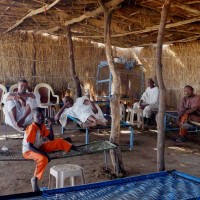 Maybe we can still retrieve the deleted photos with some special software. And if we are stopped again we will not risk loosing other pictures we took. After that we stop a few more times to take pictures of Sudan. It still is a beautiful country! And what are the chances that we will encounter that policeman again?
Maybe we can still retrieve the deleted photos with some special software. And if we are stopped again we will not risk loosing other pictures we took. After that we stop a few more times to take pictures of Sudan. It still is a beautiful country! And what are the chances that we will encounter that policeman again?
We also stop to drink some tea at one of the ‘restaurants’ along the way. We park the motorbikes and see a group of men just getting ready for afternoon prayers. One of them gestures that we can find ourselves a table, he will be right out. After prayers, he takes our order while the others examine the motorbikes and fire the usual questions at us. They consider it an adventure and can not believe we have really driven the ‘mopeds’ from Amsterdam to Sudan. When the tea arrives they excuse themselves and take a place on the beds in the corner of the restaurant. A great place to get through the hot afternoons of Sudan. The tea is on ’the house’. The man explains that as a Muslim he has a duty to take care of travellers and that he is happy that he can offer us some tea. Welcome to Sudan!
There is a lot of traffic on the road to and from Khartoum. Just like in northern Sudan we have to be very careful for oncoming buses that overtake slower traffic in the strangest places. But we also have to keep an eye on the traffic that overtakes us in order to avoid being cut off. It often happens that overtaking traffic just keeps driving next to us to examine us more closely. One car in particular acts very strangely. He continues to ride beside me for a long time, getting closer and almost pressing me off the road. I give gas to get back in front of the car, but the driver also accelerates and drives beside me again. At the point where he comes too close again, I gesture that he should back off. Then he accelerates and starts driving very closely to Peter almost pushing him off the road. Then I suddenly notice it is the policeman we met earlier that day. So yet again after all!
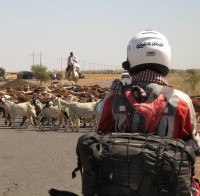 The angry policeman hangs out the window and gestures that we should stop. Apart from the uniform of the driver we can in no way see that we are dealing with police. It is a normal car. The angry man asks Peter for his passport. Peter asks in turn for the identification of the agents and explains that he is not just giving his passport to anyone. The agent starts rummaging in the glove box. First he pulls out a gun which he keeps up in the air ostentatiously while he continues looking in the glove box with his other hand. He gives a card bearing the photograph of the driver. Unfortunately, he had left his own card lying at home (yeah right…).
The angry policeman hangs out the window and gestures that we should stop. Apart from the uniform of the driver we can in no way see that we are dealing with police. It is a normal car. The angry man asks Peter for his passport. Peter asks in turn for the identification of the agents and explains that he is not just giving his passport to anyone. The agent starts rummaging in the glove box. First he pulls out a gun which he keeps up in the air ostentatiously while he continues looking in the glove box with his other hand. He gives a card bearing the photograph of the driver. Unfortunately, he had left his own card lying at home (yeah right…).
After a brief look at the passports, he asks whether we had registered (all foreigners must register as they enter Sudan and pay as much as $50 per person on top of the visa of $ 50). Peter points to the green sticker in our passports.The man takes another look. Once we have again promised that we will not take photos in Sudan, we can go. Luckily he does not ask for the missing permit. After that we see the car one more time while it stops to drive into a little town. We hope they think it is enough now. We are fed up any way.
At the end of the afternoon we leave the main road and find a wonderful old baobab tree a few kilometers down the road where we could camp. Before we pitch the tent, we sit under the tree for a while, have a drink and consider if we can sleep here without being disturbed. If after one hour no one has come to see us and it is not so warm anymore, we pitch our tent and once again cook some pasta. 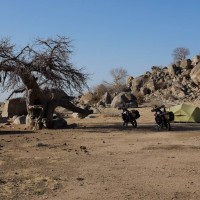 The next morning I wake up by someone who is singing loudly. I also hear the occasional cow moo and branches breaking. As I look out the window of our tent, I see a large group of cows trudge past with a boy on a donkey in front. It is the same boy that we had seen with his cows the night before when we drove onto the sandy path to the big baobab. From a distance he takes a look at our tent, but then rides along singing loudly. The cows follow him. It keeps been very special how we are left alone in Sudan.
The next morning I wake up by someone who is singing loudly. I also hear the occasional cow moo and branches breaking. As I look out the window of our tent, I see a large group of cows trudge past with a boy on a donkey in front. It is the same boy that we had seen with his cows the night before when we drove onto the sandy path to the big baobab. From a distance he takes a look at our tent, but then rides along singing loudly. The cows follow him. It keeps been very special how we are left alone in Sudan.
We drive through warm Sudan, stopping occasionally for cattle crossing the road, helping a Sudanese motorcyclist with his flat tire and eating a sandwich in the shade. Gasoline is still difficult to get, so wherever we can we fill up the motorbikes to avoid getting stranded. The landscape changes as we drive further south. We pass dry plains with the occasional brown hill and dry riverbeds meandering through the landscape. The houses are not built of clay anymore, but are made of wooden sticks and straw. Small round huts in a group together, surrounded by some cows and goats. The villages are almost impossible to see against the brown hills.
At the end of the day it takes a little more effort to find a camping spot. Right next to the road the forest is either too dense or the plain is too open. Finally we drive along some fields towards a dry river where we find a reasonably flat spot for the tent. Again we wait a bit before we pitch the tent to see if there are any angry farmers asking us to leave. Once the tent is pitched we hear a truck very close to the tent, but that is it.
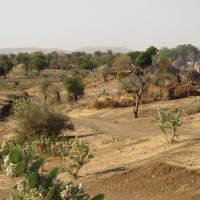 The next morning we wake up well before the alarm goes off. We sit on the motorbikes packed and ready to go by 09:00 am. After 30km we arrive in Metema, a small village with a long row of busy shops and a number of larger buildings. In no way it looks like the land border between Tunisia and Libya or between Libya and Egypt. No big gates, no stern looking officers or long lines of people waiting. Only a barrier that is manually operated by a customs official who still slumped in a broken chair.
The next morning we wake up well before the alarm goes off. We sit on the motorbikes packed and ready to go by 09:00 am. After 30km we arrive in Metema, a small village with a long row of busy shops and a number of larger buildings. In no way it looks like the land border between Tunisia and Libya or between Libya and Egypt. No big gates, no stern looking officers or long lines of people waiting. Only a barrier that is manually operated by a customs official who still slumped in a broken chair.
Before we pass underneath the barrier to Ethiopia, we still need to get some stamps on the Sudanese side first. It is not quite clear where we should go, but as usual we attract enough attention and of the bystanders exactly knows where we should go. First to the local police station for registration. We enter a large empty room. In one corner there is a television with one chair right in froth of it. A soap opera is broadcasted. On the other side there is an empty desk with only a big book and a pencil lying on it. The man behind the desk holds up his hand and asks curtly for our passports while continuing to watch the television.
After our data is recorded, our guide takes us to another building. We sit down in one of the chairs in the waiting area. We are the only people waiting and even the only ones in the entire building. The offices are empty and appear to be little used. The customs officer is still missing, but our guide is going to find him. After some time our guide comes back with a man who takes our carnets. We follow him to an office; a small room with two desks, some worn chairs and a cupboard full of binders. On one of the desks is a computer which is protected against dust by a piece of plastic. The man sits down at the other empty desk and takes out some big books, a pen and carbon paper. Then he begins to fill out one form after another, 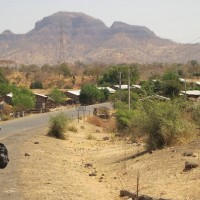 while properly placing the carbon paper in the right place. A signature here, a scribble there, a staple on one form, it seems to take forever but we finally get a stamp in our carnet.
while properly placing the carbon paper in the right place. A signature here, a scribble there, a staple on one form, it seems to take forever but we finally get a stamp in our carnet.
He refers us to the next building. This time there is an English movies showing on television. We hand over our passports and see a senior customs officer checking the documents after which he instructs his staff to take our details and stamps the passports. With the stamped passports we walk back to the motorbikes. A large group of young guys has gathered round the motorbikes offering to exchange money. The exchange rate is very bad but despite tough negotiations we do not get the price up. We decide to exchange only half of all of our Sudanese Pounds and try again in Ethiopia. We have got all the stamps, so we can go! The customs officer at the gate slowly get up from his chair, lets the barrier up and waves to us out of Sudan.
At the other side someone is already pointing us where to go on the Ethiopian side. We first have to take our passport to customs. Even though we are only 100 meters from the Sudanese customs office, it seems like we are in a completely different world. On the desks are computers, printers, cameras and even finger scanners. On the wall are posters with beautiful photos of Ethiopia, pictures of the president and the Ethiopian flag. In fluent English we are asked to take a seat in one of the chairs. 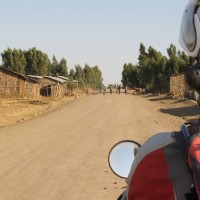 Our picture is taken with a futuristic webcam, the fingers of both our hands are scanned and all data is neatly captured in the computer. After fifteen minutes we are back outside and redirected to another building to register our motorbikes. This department of Ethiopian customs was not so lucky and has not yet received computer. The man is still using carbon paper to fill out different forms. Yet it all goes very smooth. After the man has seen our motorbikes and has verified the colour and the chassis number he puts the required stamps. Then the rope across the road (!) is lowered and we can ride into Ethiopia!
Our picture is taken with a futuristic webcam, the fingers of both our hands are scanned and all data is neatly captured in the computer. After fifteen minutes we are back outside and redirected to another building to register our motorbikes. This department of Ethiopian customs was not so lucky and has not yet received computer. The man is still using carbon paper to fill out different forms. Yet it all goes very smooth. After the man has seen our motorbikes and has verified the colour and the chassis number he puts the required stamps. Then the rope across the road (!) is lowered and we can ride into Ethiopia!
We drive through a street where many shops are located. However, it does not look like the street on the Sudanese side where we just came from. We can now read the signs and placards, because the text is not only in Amhars (the beautiful Ethiopian curl script) but also in English. In Sudan most signs were only in Arabic. It is also a much busier street. At this side of the border there are at least five times more people on the road than in Sudan. We are also struck by how colorful everyone is dressed. In Egypt and Sudan most people were dressed in brown, black or white. Now we see bright blue and bright red, colors that stand out against the dark skin of the Ethiopians. The favorite t-shirt is the green-yellow striped football shirt of the Ethiopian team.
Yet the biggest difference are the ladies! For the first time in a long time we see a lot of women on the street. And not just women, but very pretty women! 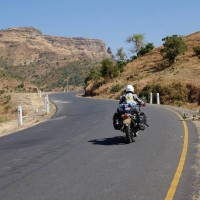 Ethiopian women are known for their beauty. Long slender bodies, handsome faces and special hairstyles. And all in Western clothes and no longer hidden under a long wide dress. I am not the only one who notices all this beauty. Over the intercom I hear several approving comments on the curves and the beautiful eyes of the Ethiopian women.
Ethiopian women are known for their beauty. Long slender bodies, handsome faces and special hairstyles. And all in Western clothes and no longer hidden under a long wide dress. I am not the only one who notices all this beauty. Over the intercom I hear several approving comments on the curves and the beautiful eyes of the Ethiopian women.
We exchange the second half of our Sudanese Pounds against an equally bad rate, buy an Ethiopian phone card and ride out of town. We set sail for Gorgora, a small town on Lake Tana. Several overlanders told us to go to “Tim & Kim Village”, a lodge and campsite that is run by a Dutch couple. On a beautiful smooth asphalt road we drive into the hills. The road winds up and for the first time in a long time we can pull the engine through the curves. Very nice after the long straight roads in Sudan. We drive from the border, which was at 700 meters to over 2,200 meters altitude. The higher we go, the cooler it becomes. That is also very nice after the hot hair dryer-like air we drove through in the weeks before.
At the end of the afternoon we drive onto the gravel road to Gorgora. It is a very bad road with large loose stones and huge “potholes”. The average speed drops to 20km per hour. It still is 60km and at this speed it will take some time before we are at the campsite.
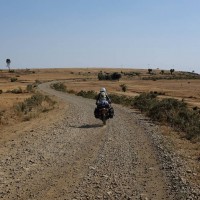 It is very busy on the road. Not with traffic , but with people! People are walking everywhere! Many of them with large packs on their heads or backs, but most with cattle. With a stick in their hand they herd donkeys, cows, goats and sheep. We are got used to being an attraction, but what is happening in Ethiopia we have not experienced before. Several times the package that they carry is thrown to the ground after which the people themselves run to the side of the road screaming with their hands on their head. Hiding behind a tree or ducking behind their cattle, they check whether the coast is clear again. And when we are inching through the small villages, I have to brake hard several times to avoid hitting a petrified pedestrian that is gaping at Peter. By the time they have recovered from the initial shock and turn around they look at me with big eyes and then run to the side of the road. OK, we may look like aliens but here we certainly feel like aliens as well for the first time.
It is very busy on the road. Not with traffic , but with people! People are walking everywhere! Many of them with large packs on their heads or backs, but most with cattle. With a stick in their hand they herd donkeys, cows, goats and sheep. We are got used to being an attraction, but what is happening in Ethiopia we have not experienced before. Several times the package that they carry is thrown to the ground after which the people themselves run to the side of the road screaming with their hands on their head. Hiding behind a tree or ducking behind their cattle, they check whether the coast is clear again. And when we are inching through the small villages, I have to brake hard several times to avoid hitting a petrified pedestrian that is gaping at Peter. By the time they have recovered from the initial shock and turn around they look at me with big eyes and then run to the side of the road. OK, we may look like aliens but here we certainly feel like aliens as well for the first time.
As quiet as the people in Sudan were, so intrusive are the people we encounter in the first Ethiopian villages. Once we stop to take a picture kids come running from all sides. “You, you, you” it sounds and “Faranji! Faranji!” (Which means “White man! White man!”). Although their hand first goes up to wave at us, the same hand then is made into a bowl and we hear “Give me pen“, “Give me money!”, “Give me something!“. Not only do children come to ask for a pen, water or food, adults also hold up their hand as we pass.
The differences with Sudan, especially with regard to the people we encounter, are overwhelming. Because we travel over land by motorbike the landscape and culture usually change very gradually. The transition from Sudan to Ethiopia however feels like the culture shock that you may experience when you fly to a distant destination. We were not prepared for this.
It is already getting dark when we arrive at the camp site and are greeted by Kim. We quickly pitch the tent, take the first shower in a week and join Kim and Tim for diner that evening. Then we hear that Saturday is ’market day’, which means that people come out of the hills to take their cattle to the villages for sale. A large number of people will not often, or perhaps even never, have seen a motorcycle let alone a rider in a motorcycle suit with a helmet. So were kind of were aliens after all.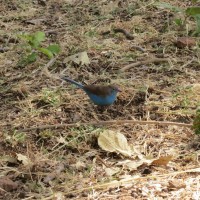
After the limited facilities at the camp sites in Khartoum and the days of bush camping it is great to be at the campsite of Tim and Kim: a toilet with a toilet seat and toilet paper and a shower with a jet of (cold) water. We enjoy the first cold beers for a long time and the delicious food cooked by Kim. Lake Tana also appears to be a birding paradise. We sit with our binoculars at the lake or under the big tree next to our tent for hours watching the most beautiful birds: Paradise Fly Catchers, Blue Cheeked Cordon Blue, Mouse Birds and Firefinches. Truly beautiful. We end up staying four nights to recover from the initial culture shock and to gain new energy to conquer the rest of Ethiopia. A great time!
—–
By leaving Sudan our time in North Africa ended. From leaving the ferry in Tunis we drove 7,200 miles through Tunisia, Libya, Egypt and Sudan. Countries that do not have good reputations and are better known for riots and wars.
Although indeed incidents happen, our experience is that the media shows those events very one-sided. The positive stories around the referendum in early January that buzzed through Egypt, could not be found in the media. To the contrary, the emphasis was placed on the number of police officers that were needed to even hold the referendum and the number of incidents that took place nonetheless. We feel that is a pity. We often thought of the book “Het zijn net mensen” (They are just like people” by the Dutch journalist and author Joris Luyendijk, in which he describes the gap between what we read in the newspaper and the actual events in a particular area. As if a parallel universe is kept up.
We were pleasantly surprised by North Africa. Because of the way we were welcome everywhere and by the extraordinary hospitality that we experienced. Moreover, we have seen beautiful things. A step back in time with Leptis Magna in Libya, pyramids in Egypt and Sudan and treasures from ancient times in the National Museum in Cairo. But also great scenery: a beautiful coastline along the Mediterranean Sea, impressive desert landscapes and the beautiful Nile. Therefore, we do not say “farewell” but “See you, North Africa”, because we would love to come back again!
—–
Click here to see the pictures
Distance covered until Gorgora = 10,079 km (6,263 miles)





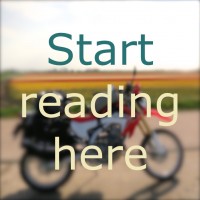
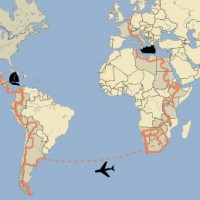
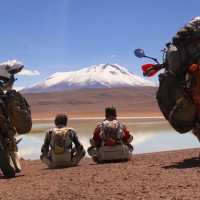
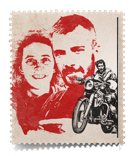
Hallo Peter en Leon
Prachtig wat jullie meemaken en zien. En mooi om een ander daar deelgenoot van te maken. Geniet van jullie reis. Blijf jullie zeker volgen.
gr. Peter Paapst
Jaa! Ethiopie! Ik ben blij dat jullie aangenaam verrast zijn door de mensen, de kleuren en de vogelrijkdom Ik kan me voorstellen dat het een cultuurshock is, ik ben benieuwd hoe jullie eindoordeel luidt, liefs Celine en Leon!
Ik kan me voorstellen dat het een cultuurshock is, ik ben benieuwd hoe jullie eindoordeel luidt, liefs Celine en Leon!
Fijn om jullie afgelopen Februari tegen te komen in Kim & Tim Village! Geniet van jullie wereldreis, wat een avontuur!
Becky, de Belg ;-)!
Prachtig stukje over ‘de media’… ik herinner me dat ik simpelweg BOOS was op de media toen we vanuit de VS Mexico in reden; ik voelde me gewoon schuldig naar de mensen toe. Ook ik was gegrepen door de gecreeerde angst voor deze groep mensen – maakte dat me mede-schuldig aan het systeem?
Geniet ervan luitjes!
Elke keer weer super om jullie verhalen te lezen. “Smaakt” altijd naar meer!
Groeten Peter, Lill en Anne
Bedankt voor schitterende verhaal.
gr Herman